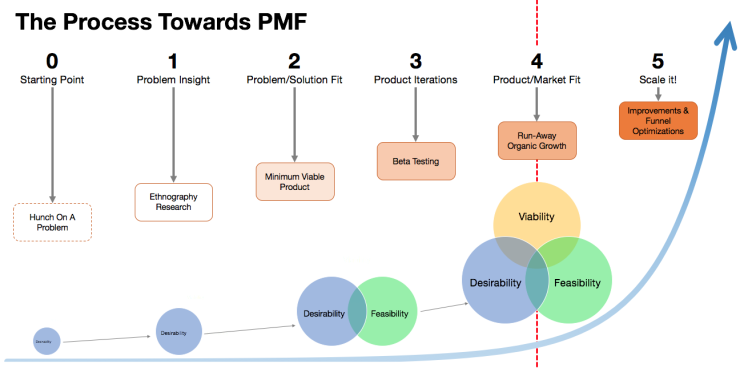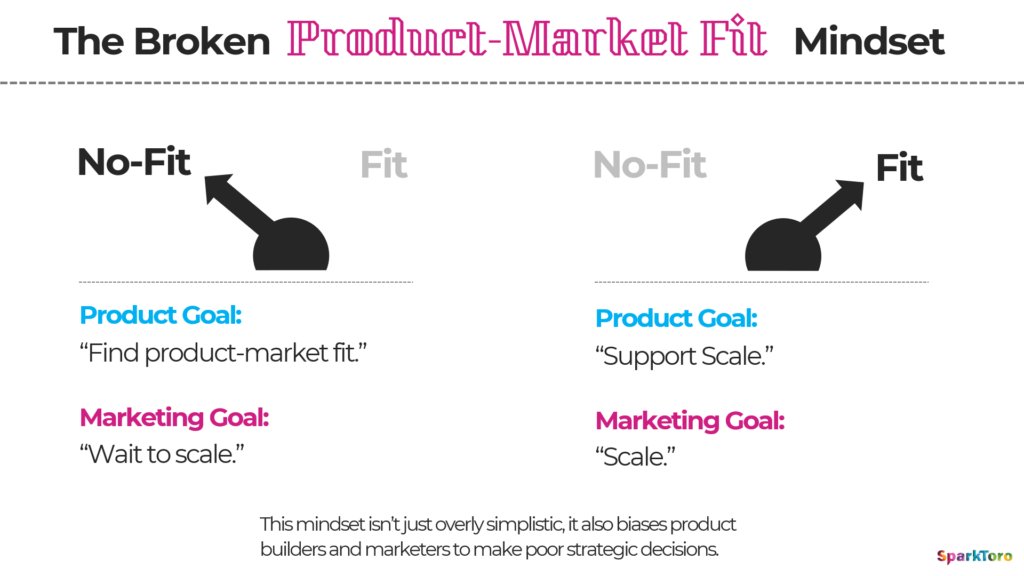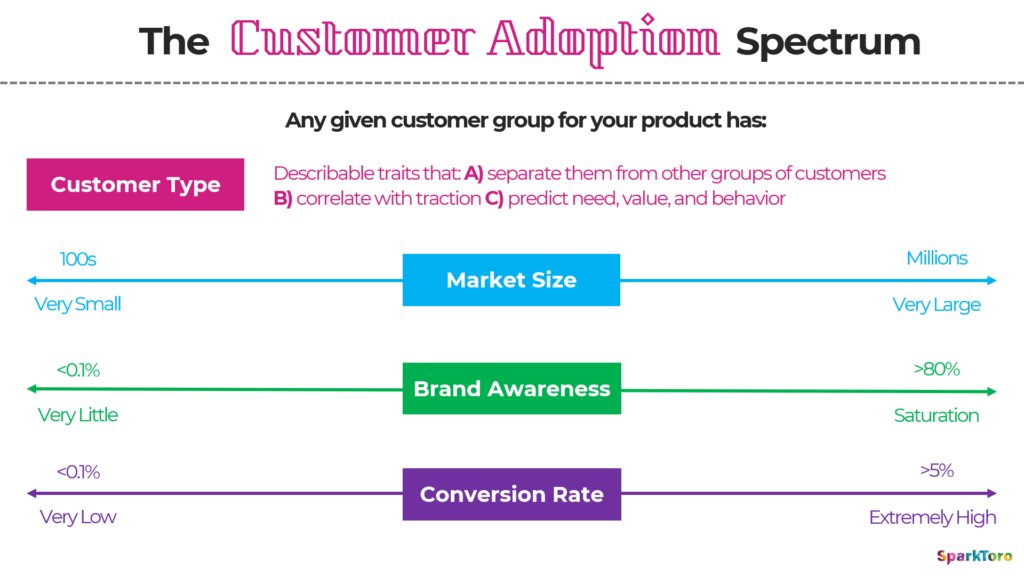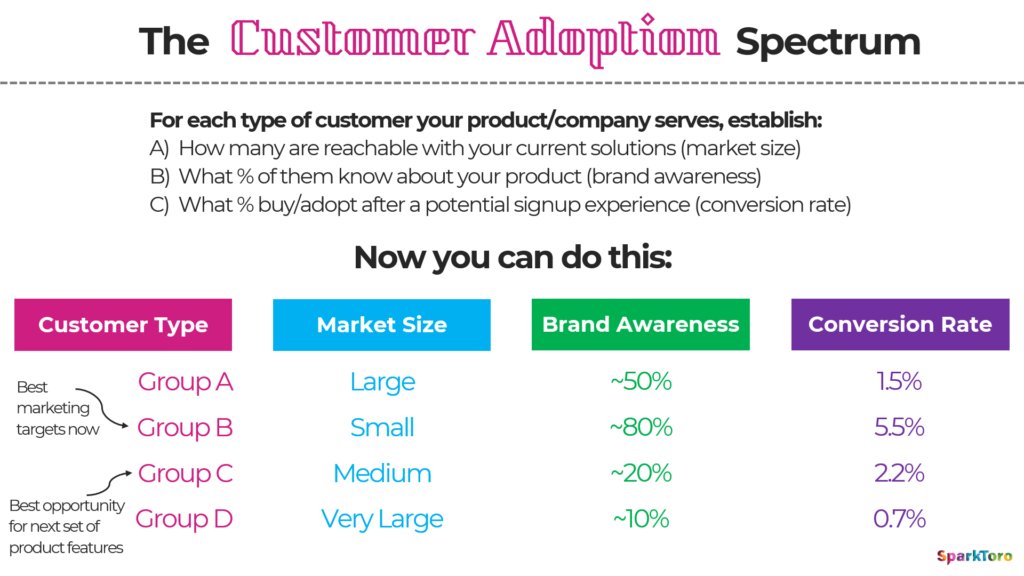Dear startup founders & product builders,
The whole idea of "product-market fit," i.e. that there& #39;s some magical, universal, knowable tipping point for when you should stop improving your product and start marketing it, is dumb. https://abs.twimg.com/emoji/v2/... draggable="false" alt="🤪" title="Zany face" aria-label="Emoji: Zany face">
https://abs.twimg.com/emoji/v2/... draggable="false" alt="🤪" title="Zany face" aria-label="Emoji: Zany face">
A thread.
The whole idea of "product-market fit," i.e. that there& #39;s some magical, universal, knowable tipping point for when you should stop improving your product and start marketing it, is dumb.
A thread.
Sometime in early 2000s, VC-types wanted a way to say:
"I don& #39;t think your product resonates w potential buyers, but I& #39;d rather not give you a metric, b/c then you might cross that hurdle, and it& #39;ll be awkward when I say no again."
Thus, "product-market fit" was born. https://abs.twimg.com/emoji/v2/... draggable="false" alt="🤓" title="Nerd-Gesicht" aria-label="Emoji: Nerd-Gesicht">
https://abs.twimg.com/emoji/v2/... draggable="false" alt="🤓" title="Nerd-Gesicht" aria-label="Emoji: Nerd-Gesicht">
"I don& #39;t think your product resonates w potential buyers, but I& #39;d rather not give you a metric, b/c then you might cross that hurdle, and it& #39;ll be awkward when I say no again."
Thus, "product-market fit" was born.
The idea made its way around Silicon Valley and into the blogs+books of the era (including, most famously, The Lean Startup).
This adoption by startup world led to every founder chasing the illusive "product-market fit," even though it has no clear, consistent demarcation.
This adoption by startup world led to every founder chasing the illusive "product-market fit," even though it has no clear, consistent demarcation.
VCs wrote blog posts and think pieces with graphics like this one.  https://abs.twimg.com/emoji/v2/... draggable="false" alt="🙄" title="Gesicht mit rollenden Augen" aria-label="Emoji: Gesicht mit rollenden Augen">
https://abs.twimg.com/emoji/v2/... draggable="false" alt="🙄" title="Gesicht mit rollenden Augen" aria-label="Emoji: Gesicht mit rollenden Augen"> https://abs.twimg.com/emoji/v2/... draggable="false" alt="🙄" title="Gesicht mit rollenden Augen" aria-label="Emoji: Gesicht mit rollenden Augen">
https://abs.twimg.com/emoji/v2/... draggable="false" alt="🙄" title="Gesicht mit rollenden Augen" aria-label="Emoji: Gesicht mit rollenden Augen"> https://abs.twimg.com/emoji/v2/... draggable="false" alt="🙄" title="Gesicht mit rollenden Augen" aria-label="Emoji: Gesicht mit rollenden Augen">
https://abs.twimg.com/emoji/v2/... draggable="false" alt="🙄" title="Gesicht mit rollenden Augen" aria-label="Emoji: Gesicht mit rollenden Augen">
PMFit lets someone dismiss a potential investment in your company, because you were "too revenue-centric" or "too sexy story." And what could you say or do in response? Nothing!
Precisely the point.
PMFit lets someone dismiss a potential investment in your company, because you were "too revenue-centric" or "too sexy story." And what could you say or do in response? Nothing!
Precisely the point.
But "product-market fit" makes us do really dumb things, like:
A) Wait to do marketing until product is a "fit"
B) Chase a nebulous gut feel from investors
C) Look for data to fit a narrative
and, perhaps worst,
D) Largely ignore product after achieving the mythical "fit"
A) Wait to do marketing until product is a "fit"
B) Chase a nebulous gut feel from investors
C) Look for data to fit a narrative
and, perhaps worst,
D) Largely ignore product after achieving the mythical "fit"
Let& #39;s get real.
The whole concept of a binary "yes" vs. "no" for product-market fit simply doesn& #39;t exist, and isn& #39;t helpful.
It& #39;s obviously a spectrum. Some products resonate more for some customers than others. So what? How does that help us?
The whole concept of a binary "yes" vs. "no" for product-market fit simply doesn& #39;t exist, and isn& #39;t helpful.
It& #39;s obviously a spectrum. Some products resonate more for some customers than others. So what? How does that help us?
Say we discard the binary and use a spectrum instead.
What can or should you do differently if your product is a 65/100 on some scale of customer-resonance vs. 45/100 or 85/100?
Again, it feels... like a useless concept (at least for founders, builders, & marketers).
What can or should you do differently if your product is a 65/100 on some scale of customer-resonance vs. 45/100 or 85/100?
Again, it feels... like a useless concept (at least for founders, builders, & marketers).
Feels obvious that, instead, we should approach an exercise like this as a way to solve strategic problems: to choose what things to invest and not invest in.
How might we do that?
How might we do that?
1) Split up customers/potential customers into segments
2) Figure out where and with whom we have opportunity
3) Make decisions about what kind of product or marketing investments to make, and when.
2) Figure out where and with whom we have opportunity
3) Make decisions about what kind of product or marketing investments to make, and when.
Delighted a customer group, but very few potential customers like them even know about you? Go full-throttle on brand marketing.
Have a high-opportunity group your product doesn& #39;t yet resonate with? Solve that before you spend more marketing energy on them.
Have a high-opportunity group your product doesn& #39;t yet resonate with? Solve that before you spend more marketing energy on them.
If you& #39;re an investor with a gut feel, that& #39;s cool. Say "my gut& #39;s telling me not to invest, sorry." But don& #39;t build an indefinable, behavior-biasing concept just to get out of a hard talk.
And if you& #39;re a founder, ignore that investor drek. Build for & market to customers.
And if you& #39;re a founder, ignore that investor drek. Build for & market to customers.
I wrote a whole blog post about this last night with more detail: https://sparktoro.com/blog/product-market-fit-is-a-broken-concept-theres-a-better-way/
But">https://sparktoro.com/blog/prod... Twitter (obvs) likes to show you tweets without links that keep you here on their site. It& #39;s how they got product-market fit. https://abs.twimg.com/emoji/v2/... draggable="false" alt="😅" title="Lächelndes Gesicht mit offenem Mund und Angstschweiß" aria-label="Emoji: Lächelndes Gesicht mit offenem Mund und Angstschweiß">
https://abs.twimg.com/emoji/v2/... draggable="false" alt="😅" title="Lächelndes Gesicht mit offenem Mund und Angstschweiß" aria-label="Emoji: Lächelndes Gesicht mit offenem Mund und Angstschweiß"> https://abs.twimg.com/emoji/v2/... draggable="false" alt="😅" title="Lächelndes Gesicht mit offenem Mund und Angstschweiß" aria-label="Emoji: Lächelndes Gesicht mit offenem Mund und Angstschweiß">
https://abs.twimg.com/emoji/v2/... draggable="false" alt="😅" title="Lächelndes Gesicht mit offenem Mund und Angstschweiß" aria-label="Emoji: Lächelndes Gesicht mit offenem Mund und Angstschweiß"> https://abs.twimg.com/emoji/v2/... draggable="false" alt="😅" title="Lächelndes Gesicht mit offenem Mund und Angstschweiß" aria-label="Emoji: Lächelndes Gesicht mit offenem Mund und Angstschweiß">
https://abs.twimg.com/emoji/v2/... draggable="false" alt="😅" title="Lächelndes Gesicht mit offenem Mund und Angstschweiß" aria-label="Emoji: Lächelndes Gesicht mit offenem Mund und Angstschweiß">
But">https://sparktoro.com/blog/prod... Twitter (obvs) likes to show you tweets without links that keep you here on their site. It& #39;s how they got product-market fit.

 Read on Twitter
Read on Twitter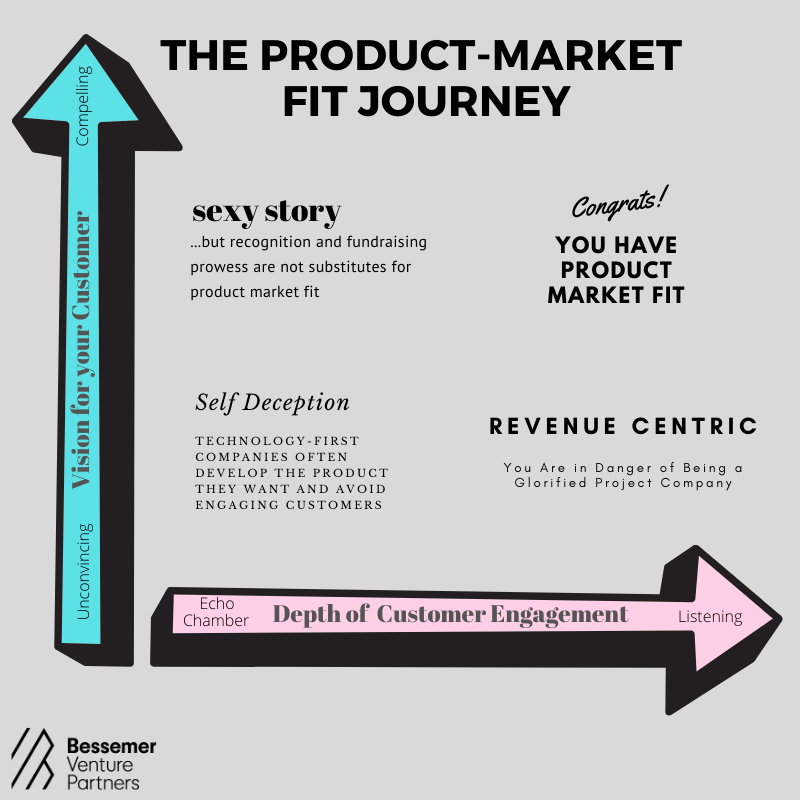 https://abs.twimg.com/emoji/v2/... draggable="false" alt="🙄" title="Gesicht mit rollenden Augen" aria-label="Emoji: Gesicht mit rollenden Augen">https://abs.twimg.com/emoji/v2/... draggable="false" alt="🙄" title="Gesicht mit rollenden Augen" aria-label="Emoji: Gesicht mit rollenden Augen">PMFit lets someone dismiss a potential investment in your company, because you were "too revenue-centric" or "too sexy story." And what could you say or do in response? Nothing!Precisely the point." title="VCs wrote blog posts and think pieces with graphics like this one. https://abs.twimg.com/emoji/v2/... draggable="false" alt="🙄" title="Gesicht mit rollenden Augen" aria-label="Emoji: Gesicht mit rollenden Augen">https://abs.twimg.com/emoji/v2/... draggable="false" alt="🙄" title="Gesicht mit rollenden Augen" aria-label="Emoji: Gesicht mit rollenden Augen">https://abs.twimg.com/emoji/v2/... draggable="false" alt="🙄" title="Gesicht mit rollenden Augen" aria-label="Emoji: Gesicht mit rollenden Augen">PMFit lets someone dismiss a potential investment in your company, because you were "too revenue-centric" or "too sexy story." And what could you say or do in response? Nothing!Precisely the point." class="img-responsive" style="max-width:100%;"/>
https://abs.twimg.com/emoji/v2/... draggable="false" alt="🙄" title="Gesicht mit rollenden Augen" aria-label="Emoji: Gesicht mit rollenden Augen">https://abs.twimg.com/emoji/v2/... draggable="false" alt="🙄" title="Gesicht mit rollenden Augen" aria-label="Emoji: Gesicht mit rollenden Augen">PMFit lets someone dismiss a potential investment in your company, because you were "too revenue-centric" or "too sexy story." And what could you say or do in response? Nothing!Precisely the point." title="VCs wrote blog posts and think pieces with graphics like this one. https://abs.twimg.com/emoji/v2/... draggable="false" alt="🙄" title="Gesicht mit rollenden Augen" aria-label="Emoji: Gesicht mit rollenden Augen">https://abs.twimg.com/emoji/v2/... draggable="false" alt="🙄" title="Gesicht mit rollenden Augen" aria-label="Emoji: Gesicht mit rollenden Augen">https://abs.twimg.com/emoji/v2/... draggable="false" alt="🙄" title="Gesicht mit rollenden Augen" aria-label="Emoji: Gesicht mit rollenden Augen">PMFit lets someone dismiss a potential investment in your company, because you were "too revenue-centric" or "too sexy story." And what could you say or do in response? Nothing!Precisely the point." class="img-responsive" style="max-width:100%;"/>
